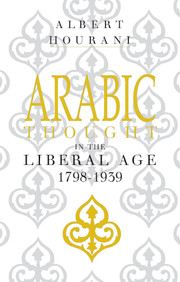Book contents
- Frontmatter
- Contents
- Preface to the 1983 reissue
- Note on Transliteration and References
- I THE ISLAMIC STATE
- II THE OTTOMAN EMPIRE
- III FIRST VIEWS OF EUROPE
- IV THE FIRST GENERATION: TAHTAWI, KHAYR AL-DIN, AND BUSTANI
- V JAMAL AL-DIN AL-AFGHANI
- VI MUHAMMAD ‘ABDUH
- VII ‘ABDUH'S EGYPTIAN DISCIPLES: ISLAM AND MODERN CIVILIZATION
- VIII EGYPTIAN NATIONALISM
- IX RASHID RIDA
- X CHRISTIAN SECULARISTS: SHUMAYYIL AND ANTUN
- XI ARAB NATIONALISM
- XII TAHA HUSAYN
- XIII EPILOGUE: PAST AND FUTURE
- Select Bibliography
- Index
- Frontmatter
- Contents
- Preface to the 1983 reissue
- Note on Transliteration and References
- I THE ISLAMIC STATE
- II THE OTTOMAN EMPIRE
- III FIRST VIEWS OF EUROPE
- IV THE FIRST GENERATION: TAHTAWI, KHAYR AL-DIN, AND BUSTANI
- V JAMAL AL-DIN AL-AFGHANI
- VI MUHAMMAD ‘ABDUH
- VII ‘ABDUH'S EGYPTIAN DISCIPLES: ISLAM AND MODERN CIVILIZATION
- VIII EGYPTIAN NATIONALISM
- IX RASHID RIDA
- X CHRISTIAN SECULARISTS: SHUMAYYIL AND ANTUN
- XI ARAB NATIONALISM
- XII TAHA HUSAYN
- XIII EPILOGUE: PAST AND FUTURE
- Select Bibliography
- Index
Summary
That those who speak Arabic form a ‘nation’, and that this nation should be independent and united, are beliefs which only became articulate and acquired political strength during the present century. But as far back in history as we can see them, the Arabs have always been exceptionally conscious of their language and proud of it, and in pre-Islamic Arabia they possessed a kind of ‘racial’ feeling, a sense that, beyond the conflicts of tribes and families, there was a unity which joined together all who spoke Arabic and could claim descent from the tribes of Arabia. All tribes had a common family tree, universally known and accepted, and whether it was genuine or fictitious is not to the point. After the rise of Islam, and when Islam and the Arabic language spread far beyond the peninsula, this ‘family’ came to include many who were of different origin, while not excluding those, like the tribe of Banu Ghassan, who were Arab by origin but did not accept the new religion.
In the history of Islam, and indeed in its essential structure, the Arabs had a special part. The Quran is in Arabic, the Prophet was an Arab, he preached first to Arabs, who formed the ‘matter of Islam’, the human instrument through which the religion and its authority spread; Arabic became and has remained the language of devotion, theology, and law.
- Type
- Chapter
- Information
- Arabic Thought in the Liberal Age 1798–1939 , pp. 260 - 323Publisher: Cambridge University PressPrint publication year: 1983



